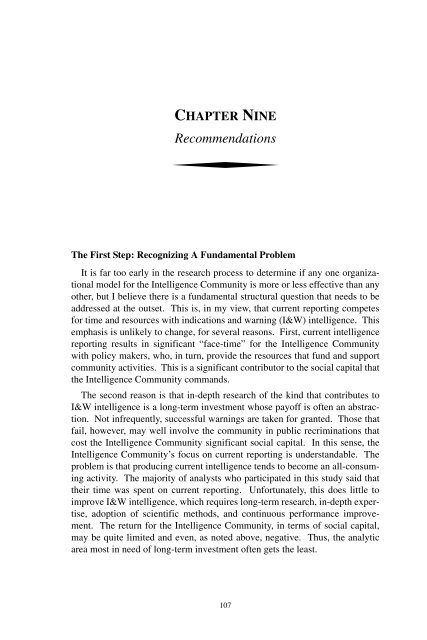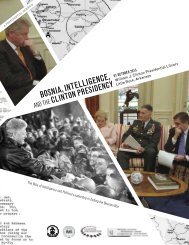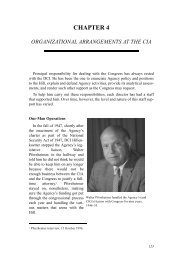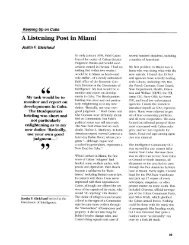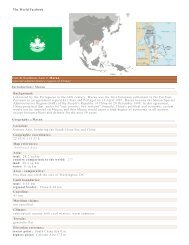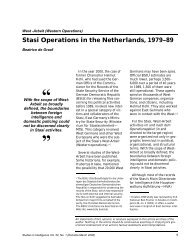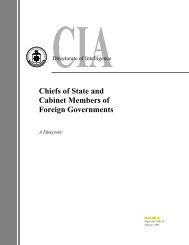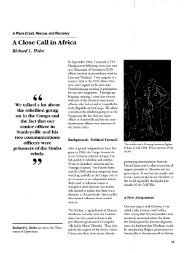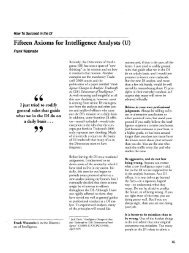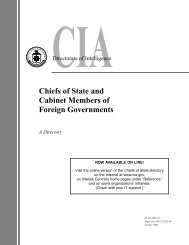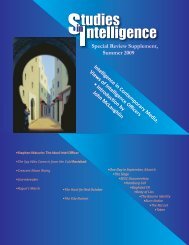Analytic Culture in the U.S. Intelligence Community (PDF) - CIA
Analytic Culture in the U.S. Intelligence Community (PDF) - CIA
Analytic Culture in the U.S. Intelligence Community (PDF) - CIA
You also want an ePaper? Increase the reach of your titles
YUMPU automatically turns print PDFs into web optimized ePapers that Google loves.
CHAPTER NINE<br />
Recommendations<br />
The First Step: Recogniz<strong>in</strong>g A Fundamental Problem<br />
It is far too early <strong>in</strong> <strong>the</strong> research process to determ<strong>in</strong>e if any one organizational<br />
model for <strong>the</strong> <strong>Intelligence</strong> <strong>Community</strong> is more or less effective than any<br />
o<strong>the</strong>r, but I believe <strong>the</strong>re is a fundamental structural question that needs to be<br />
addressed at <strong>the</strong> outset. This is, <strong>in</strong> my view, that current report<strong>in</strong>g competes<br />
for time and resources with <strong>in</strong>dications and warn<strong>in</strong>g (I&W) <strong>in</strong>telligence. This<br />
emphasis is unlikely to change, for several reasons. First, current <strong>in</strong>telligence<br />
report<strong>in</strong>g results <strong>in</strong> significant “face-time” for <strong>the</strong> <strong>Intelligence</strong> <strong>Community</strong><br />
with policy makers, who, <strong>in</strong> turn, provide <strong>the</strong> resources that fund and support<br />
community activities. This is a significant contributor to <strong>the</strong> social capital that<br />
<strong>the</strong> <strong>Intelligence</strong> <strong>Community</strong> commands.<br />
The second reason is that <strong>in</strong>-depth research of <strong>the</strong> k<strong>in</strong>d that contributes to<br />
I&W <strong>in</strong>telligence is a long-term <strong>in</strong>vestment whose payoff is often an abstraction.<br />
Not <strong>in</strong>frequently, successful warn<strong>in</strong>gs are taken for granted. Those that<br />
fail, however, may well <strong>in</strong>volve <strong>the</strong> community <strong>in</strong> public recrim<strong>in</strong>ations that<br />
cost <strong>the</strong> <strong>Intelligence</strong> <strong>Community</strong> significant social capital. In this sense, <strong>the</strong><br />
<strong>Intelligence</strong> <strong>Community</strong>’s focus on current report<strong>in</strong>g is understandable. The<br />
problem is that produc<strong>in</strong>g current <strong>in</strong>telligence tends to become an all-consum<strong>in</strong>g<br />
activity. The majority of analysts who participated <strong>in</strong> this study said that<br />
<strong>the</strong>ir time was spent on current report<strong>in</strong>g. Unfortunately, this does little to<br />
improve I&W <strong>in</strong>telligence, which requires long-term research, <strong>in</strong>-depth expertise,<br />
adoption of scientific methods, and cont<strong>in</strong>uous performance improvement.<br />
The return for <strong>the</strong> <strong>Intelligence</strong> <strong>Community</strong>, <strong>in</strong> terms of social capital,<br />
may be quite limited and even, as noted above, negative. Thus, <strong>the</strong> analytic<br />
area most <strong>in</strong> need of long-term <strong>in</strong>vestment often gets <strong>the</strong> least.<br />
107


